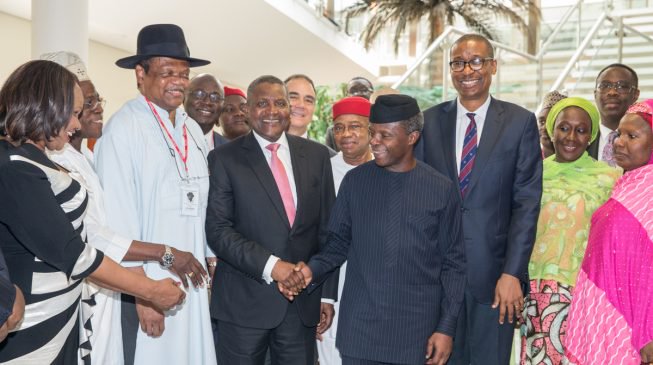Dangote Group, the Nigeria Liquefied Natural Gas Limited, NLNG, Lafarge Africa Plc and three other companies have keyed into the federal government’s drive to build infrastructure across Nigeria.
The companies, which also include Unilever Nigeria Plc, Flour Mills of Nigeria Plc, and China Road and Bridge Corporation Nigeria Limited, will build19 roads, totalling 794.4 kilometres in 11 states across each of the six geopolitical zones of the country.
The affected states and roads are not yet mentioned.
This is made possible with the signing of executive order 007 2019, by President Muhammadu Buhari to allow private companies construct and refurbish roads across the country.
Following the order, the two-year-old Nigeria Industrial Policy and Competitiveness Advisory Council (Industrial Council) has chalked a landmark achievement in accelerating infrastructure development for economic growth.
Zainab Ahmed, the Minister of Finance, who listed the roads at the signing ceremony, said the scheme was the outcome of efforts to think outside of the box and deploy new techniques to develop critical road infrastructure in the country.
The executive order is a Road Infrastructure Development and Refurbishment Investment Tax Credit Scheme that enables the federal government leverage private sector funding for the construction or refurbishment of eligible road infrastructure projects.
It also focuses on the development of eligible road infrastructure projects in an efficient and effective manner that creates value for money through private sector discipline; and guarantees participants in the scheme timely and full recovery of funds provided for the construction or refurbishment of eligible road infrastructure projects through tax credits.
It is also one of the initiatives midwived by the Policy and Regulation Subcommittee of the Industrial Council, which is focused on implementing initiatives to incentivize investment; and reduce smuggling.
In his speech at the signing ceremony, Aliko Dangote, president and CEO of Dangote Group, stated: “The impact is huge because it will allow private sector to use their capital, their know-how and also their efficiency in terms of delivering roads in time and the Nigerian government will be saving billions of naira.”
The Federal Executive Council approved the Industrial Council in March 2017 as a vehicle for partnering with the private sector on the industrialisation agenda to address key hindrances to the growth of manufacturing in the country.
The council, chaired by, aims to increase the contribution of the manufacturing sector to gross domestic product and establish Nigeria as the manufacturing hub for Africa by implementing initiatives aimed at accelerating industrialization by leveraging private sector expertise and capital.
Okechukwu Enelamah, minister of industry, trade, and investment, who is one of its vice chairmen of the council, explained that, “the council’s mandate is to assist the government in implementing initiatives that will enhance the performance of the industrial sector through partnerships with the private sector.”
The leadership of the Industrial Council consists of Vice-President Yemi Osinbajo (Chairman); Enelamah (vice-chairman, public sector); Aliko Dangote (vice-chairman private sector); Aisha Abubakar, minister of state, industry, trade and investment, (Alternate vice-chairman, public sector); and Atedo Peterside (alternate vice-chairman, private sector).
Other infrastructure initiatives which the Industrial Council is facilitating their implementation include the ongoing the deployment of 18,000 KM of fibre across the country to improve broadband penetration; and the generation of additional 4.2GW of power to the national grid.

